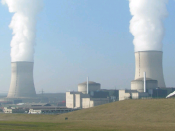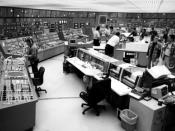As we enter the new era of technological advances, our fuel and energy usage have been increasing in a tremendous rate. This is a warning to us human beings that the natural resources of the earth are all consumed and reminds us of the issue of global warming. To resolve these global issues, our scientists have been searching for new energy resources, and one of lately founded energy resource emerged from all the other resources, and that is nuclear power. Nuclear power has potential of being the one of the main energy resources in the future. In this essay, we will look closely at the benefits and limitations of one of the applications of nuclear power: nuclear power plants, and determine whether the limitations overweigh the benefits.
Nuclear power plants are stations that generate electricity. To produce electricity, these power plants convert other forms of energy into electrical energy, and nuclear fission occurs when they divide the nucleus of atoms to smaller particles and produce energy.
The element that is used as fuel in nuclear reactors is one of the isotopes of Uranium, 235U. Nuclear power plants use 235U because in a fission reaction, a neutron is absorbed by a nucleus of 235U, and the resulting nucleus of 236U is unstable and splits apart. The fission reaction produces a huge amount of energy, and this is because some of the mass of the original 236U nuclei is converted to energy. Most of the energy is carried away as the kinetic energy of the two lighter nuclei, and some is emitted as gamma radiation. If more than one neutron from each fission causes fission in surrounding nuclei, then the reaction escalates, and this is called a chain reaction, and this is necessary in order for the power plants to generate electricity.


